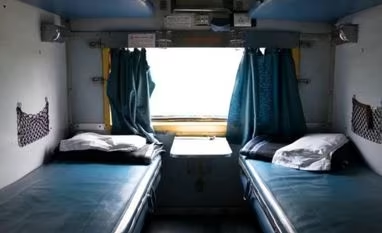Frequent travellers on Indian Railways may want to think twice before settling in for a cozy ride. A recent disclosure, obtained through a Right to Information (RTI) request by The New Indian Express, has revealed a glaring lapse in hygiene practices: While bed sheets and pillow covers in air-conditioned coaches are washed after every journey, blankets are cleaned just once a month — or even less frequently.
This hygiene gap has left many passengers questioning the cleanliness of the bedding they rely on during their travels, raising concerns about whether Indian Railways is doing enough to ensure passenger comfort and safety.
Clean sheets, dirty blankets: A hygienic disparity
Passengers travelling in air-conditioned coaches receive a neatly packaged set of bedding, which includes bed sheets, pillow covers, and blankets. While the cost of these items is included in the train fare, there is a glaring disparity in how they are maintained. According to the RTI response, bed sheets and pillow covers are washed after every journey, ensuring a fresh set for each new passenger. However, the same cannot be said for blankets.
Rishu Gupta, section officer of Environment and Housekeeping Management (EnHM) at the Ministry of Railways, confirmed that wool blankets are only washed once a month, or twice in rare cases when they are particularly soiled. This has caused discontent among passengers who feel they are paying for bedding that does not meet basic hygiene standards.
Housekeeping confirms limited blanket cleaning
Housekeeping staff on long-distance trains confirmed that the infrequent washing of blankets is a common practice. One staff member, with over ten years of experience, disclosed that blankets are only sent for washing once a month, and even then, only if they are visibly dirty. “We only give the blankets for washing if there’s a foul smell or if something like vomit or food spills on them. Otherwise, we just fold them up and use them again,” he admitted.
This casual approach to cleanliness has left many passengers questioning how often they are actually getting a clean blanket. While bed sheets and pillow covers are routinely laundered, the blankets are simply folded and stored for the next journey unless a complaint is raised or a visible issue is detected.
A history of inadequate hygiene
Concerns over blanket hygiene are not new. A 2017 report from the Comptroller and Auditor General (CAG) had already flagged serious issues, revealing that some blankets went unwashed for as long as six months. Despite this damning report, Indian Railways’ blanket cleaning protocols appear to have seen little improvement, with the recent RTI confirming that minimal cleaning is still the norm.
Also Read
Calls to replace wool blankets
In light of these revelations, experts and former railway officials are now calling for Indian Railways to phase out wool blankets altogether. A retired senior officer from the EnHM division suggested that these heavy blankets, which are difficult to clean, are no longer fit for purpose. “The blankets are too heavy, and ensuring they are properly washed is a challenge. It’s high time the Railways replaced them with lighter, easier-to-maintain alternatives,” she said.
Passengers seem to agree. Many have expressed dissatisfaction with the blankets provided, pointing out that their dark colours — typically black or brown — often hide stains, making it hard to tell when they are truly clean.
Railways’ laundry management in question
Indian Railways operates a vast laundry network, with 46 departmental laundries and 25 Build-Own-Operate-Transfer (BOOT) laundries across the country. Departmental laundries are owned by the Railways, but the staff are often employed on a contractual basis. In BOOT laundries, the land belongs to Indian Railways, while private contractors manage the washing equipment and staffing.
Despite these resources, the cleanliness of blankets continues to be a sticking point. While the infrastructure is in place to maintain clean bedding, the current protocols for washing blankets do not appear to be sufficient, leaving passengers with doubts about the hygiene of the bedding they use during long-distance travel.
)